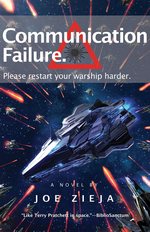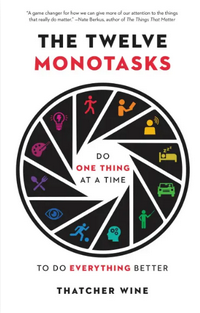 |
The Twelve Monotasks:
|

What’s The Twelve Monotasks About?
We live in a society that celebrates the multitaskers, those who seemingly do a half-dozen things at once—while posting about it on Twitter/Instagram/etc. We feel inadequate if we’re not at that level—and if we are, we should be pushing for more. Thatcher Wine wants to call us back—at least some of the time, not necessarily all the time–to a more straightforward, more focused (remember focus?) way of life and work. Arguably, this would be a healthier and less stressed way of life as well.
Using research from Neuroscience, Psychology, and insights from mindfulness practices, Wine outlines Twelve things to focus on—monotasks—Reading, Walking, Listening, Slppeing, Eating, Getting THere, Learning, Teaching, Playing, Seeing, Creating, and Thinking. After making his case of “The Art and Science of Monotasking,” Wine spends one chapter on each monotask, describing and defining it, showing its benefits, and giving some exercises to help the reader start practicing the task. He then gives a couple of wrap-up chapters—encouragements to practice these (and other monotasks) and reminders of the benefits.
A Few Highlights
I really like this idea—I know I need to focus more and this approach seems like a good way to build that ability.
Some of the chapters seemed more attractive to me, as well as easier to fit into at least my life—the Walking, Eating, Seeing, and Playing chapters really stood out. Oh, and, obviously, the Reading chapter—that’s a given, right? It was a great way to start that part of the book. I’m not saying I thought the others were a waste of time or anything, but I read these chapters and immediately identified how I could easily make that part of my life and what the benefits would be. I bet most readers will have a few chapters like that, too—ones that jump out at them as being good fits—their lists will vary from mine, but they’ll have theirs.
The chapters laying out the individual monotasks are arranged the same—by the third you know where you’re going to find what—the explanations, the benefits, the challenges, the practical exercises. It’s a firm outline and easy to use.
Overall, for me, one of the biggest selling points of the book is that it provides a different vocabulary for what’s likely a good idea. I’ve read a few books and taken a few classes on dealing with stress, emotional wellness, etc. lately—one recurring idea was mindfulness, being present, and so on. There was something about the language that bothered me. I liked the concepts, but the pseudo-spirituality/pseudo-psychological terms it was couched it didn’t sit right with me. I always felt like I was being silly in not being comfortable with them, but it was a real stumbling block for me. Now, Wine’s monotasking isn’t the same idea—but they’re compatible, really compatible. But his approach, his terminology comes without the touchy-feely connotation—making it more palatable to many readers (I can’t imagine I’m the only one).
A Few Problems
While there were a few chapters that jumped out at me as being easily useful and adopted, there were a few that didn’t seem that easy to work into my life—and I’m not sure that Wine convinced me would be that helpful for me: Travel, Thinking, and Teaching. It’s possible—maybe even likely—that once I do the exercises, I’ll change my mind.
For some of the monotasks (and those three are good examples, again, your results may vary), I really had to wonder how universally adoptable they’d be. For example—I commute alone, in the dark (one way)—I can’t do a lot of what he suggests in the Travel chapter. Some of the others seem more geared toward people like Wine—the self-employed, business owners, or managerial types—all with a degree of affluence. People who are at the low end of the corporate ladder, don’t have the freedom or ability to do a lot of this. It doesn’t take down the whole system, but it’s a chink in the armor.
On the more nitty-gritty end of things, there’s a lack of variety in personal anecdotes that Wine uses. There are three formative events in his life that he uses as the basis for observation, for personal examples, etc. Were I him, I’d probably base most things I say off of those same events/experiences. It just makes the reading seem repetitive. This isn’t an attack or a problem with the system he’s proposing, it just makes the reading a bit duller.
So, what did I think about The Twelve Monotasks?
As always, I’m trying not to evaluate the arguments or thesis—my goal is to talk about the reading experience. That said, if I was going to evaluate Wine’s arguments and proposed methods—it’d be a pretty positive assessment. This is definitely the kind of book I’m likely to return to, but more on that in a minute.
The problem with evaluating the reading experience is that I didn’t read it the way Wine intended. Once you get to Part II, “The Twelve Monotaks,” the reader is supposed to take them one chapter at a time. Read about the task, take in the guidance and practice it before moving on to the next. I didn’t have that kind of time between the publicist and today (even if I waited until release day, I wouldn’t have). But I can imagine how that would work—and it’d be better than plowing through it as I did.
But even plowing through without the breaks take each in turn with some practice, I got a pretty good idea of how it should work. It seems like a solid approach, one that’s not overwhelming either—rather than trying to work in 12 or so new disciplines into your life, go for one. And then another. It’s the camel nose in the tent approach. I can see that when I return to this in the coming months, slowly bringing in each task to my life is going to work much better than diving in and trying to add all twelve at once.
A lofty goal—helping people learn/relearn/recapture the ability to focus in a world full of distraction—and a common-sense approach to pursue it. It’s the makings of a good read—whether the method is successful or not is probably up to the reader. But Wine gives the tools in an attractive, easy-to-read manner.
Disclaimer: I received this eARC from Little, Brown & Co. via NetGalley in exchange for this post—thanks to both for this.

This post contains an affiliate link. If you purchase from it, I will get a small commission at no additional cost to you. As always, opinions are my own.
![]()


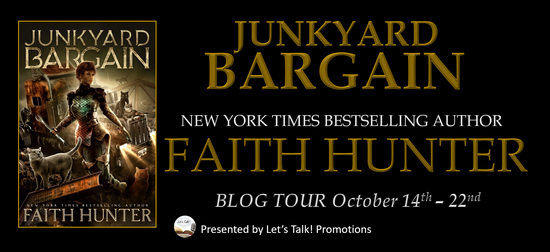
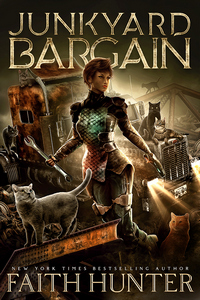




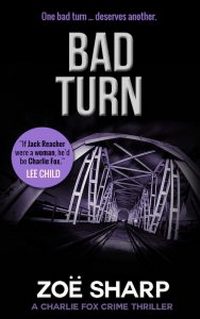

 that caught my eye this week. You’ve probably seen some/most/all of them, but just in case:
that caught my eye this week. You’ve probably seen some/most/all of them, but just in case:
 Episode (or two) you might want to give a listen to:
Episode (or two) you might want to give a listen to: I’d like to say hi and extend a warm welcome to
I’d like to say hi and extend a warm welcome to 


